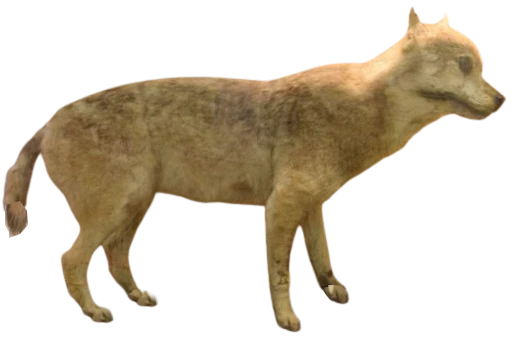
The Japanese Wolf (Canis lupus hodophilax) was a carnivorous canid once endemic to Japan. This wolf was one of the smallest subspecies of wolves, but it is now considered extinct.
The Japanese Wolf was distinguished by its small size, measuring about 90 cm in length and weighing between 15 and 20 kg. Its fur was generally gray with brownish hues. It had a relatively large head and very short, rounded ears.
The Japanese Wolf belongs to the Canidae family.
This wolf was one of the smallest subspecies of wolves and was endemic to Japan.
The Japanese Wolf lived in the mountains, dense forests, and plains of Japan, primarily on the islands of Honshū, Shikoku, and Kyūshū. Adapted to various terrains, it played a crucial role in the balance of local ecosystems.
Probably solitary or living in small packs, the Japanese Wolf was an opportunistic predator. It hunted deer, wild boars, and other medium-sized animals, but it could also feed on carcasses.
The causes of its extinction include intensive hunting, diseases such as rabies introduced by domestic dogs, and the loss of its natural habitat. The last Japanese Wolf is believed to have been killed in 1905 in Nara Prefecture.
The Japanese Wolf holds a special place in Japanese folklore, often perceived as a protector of travelers and crops. Its extinction has reinforced its status as a mythical figure.
The Japanese Wolf was an opportunistic carnivore, primarily feeding on deer, wild boars, and small mammals. It could also consume carrion and fruits when food was scarce.
The Japanese Wolf belongs to the genus Canis, which also includes the Gray Wolf (Canis lupus). These two species share common characteristics, notably their social structure in packs and their hunting habits. However, the Japanese Wolf was distinguished by its smaller size and specific adaptation to Japanese ecosystems.
These species demonstrate the diversity of the genus Canis, highlighting the varied adaptations that enable their survival in distinct environments around the world.
Although the Japanese Wolf is extinct, here are some tips for observing other species of wolves in their natural habitat:
By following these recommendations, you can admire these fascinating animals while minimizing disturbances.